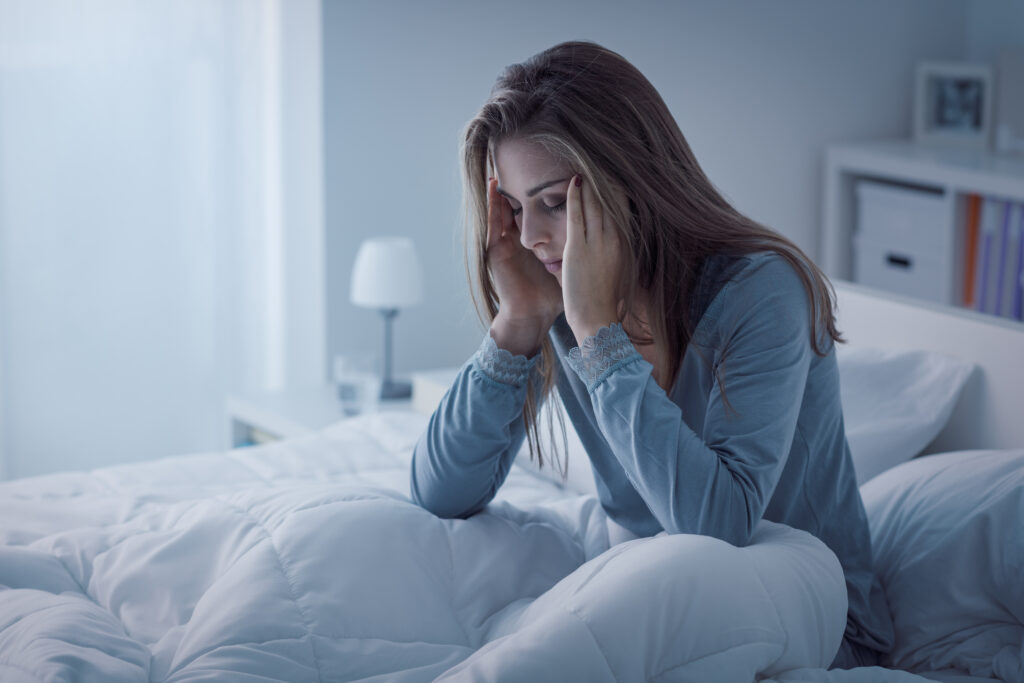
Getting quality sleep is helpful to your mental and physical well-being. There are various benefits of sleeping well. Difficulty falling asleep or staying asleep at night may indicate a sleep disorder.
Insomnia occurs when you have trouble falling asleep, which causes you to stay up most or all of the night. Those with insomnia may also wake up often throughout the night. There are treatments for insomnia that can help you restore your sleep.
What Is Insomnia and What Causes It?
Insomnia is a sleep disorder that causes frequent waking throughout the night, trouble falling asleep, or lack of fulfilling sleep. Insomnia is a common sleep disorder. According to the National Heart, Lung, and Blood Institute, short-term insomnia lasting less than three months is often caused by high stress levels, environmental changes, or schedule changes.
The National Institute of Health mentions the following factors may cause long-term insomnia:
- Stress
- Being a light sleeper
- Depression, anxiety, or PTSD
- Chronic pain
- Restless legs syndrome
- Mobility issues
- GERD
- Respiratory issues
- Those with substance use disorders
Additionally, the combination of various medical and mental health disorders can cause or increase your risk for insomnia.
What Are the Symptoms of Insomnia?
There are many different symptoms associated with insomnia.
Common insomnia symptoms include:
- Trouble falling asleep
- Waking up and being unable to go back to sleep
- Disrupted sleep
- Waking up in the middle of the night but falling back asleep
- Feeling sleepy or unwell during the day
- Irritability
- Responding slower than usual or having delayed processing
- Mood changes
- Difficulty concentrating or focusing
These symptoms can make it challenging to go about your daily life. With insomnia, work or school can be more difficult. It may also affect how you relate to others, as insomnia can cause mood changes and irritability.
What Lifestyle Changes Can I Make To Help With Insomnia?
If you are living with insomnia, you can make lifestyle changes to help you get more fulfilling and restful sleep. Practicing good sleep habits or sleep hygiene can help deal with insomnia.
Here are some tips for maintaining good sleep habits:
- Follow a consistent sleep schedule: Go to bed and wake up at the same time each day
- Set up your environment for sleep: Make sure your room is dark, comfortable, and at a temperature you like
- Avoid being on electronics right before you try to sleep
- Exercise regularly: This can help you fall asleep easier at night
- Refrain from caffeine or alcohol right before bed
For some people, lifestyle changes such as those listed above can help you improve your sleep. Others may have to try other methods for treating their insomnia.
What Treatments Are Available for Insomnia?
Outside of lifestyle changes, there are other treatments available for insomnia.
Medications for Insomnia
One common choice for treating insomnia is taking medications to help you fall asleep and stay asleep. You can choose between over-the-counter medicines or prescription medications.
Some standard over-the-counter options to help aid in good sleep include:
- Melatonin
- Unisom
- Antihistamines such as Benadryl
Some common prescription drugs used to help aid in sleep and treat insomnia include:
- Ambien
- Lunesta
- Belsomra
- Elavil
- Trazodone
- Restoril
Before taking any over-the-counter or prescription medications, speaking with your healthcare provider about dosing, side effects, and any potential interactions is best.
Mental health treatment
Obtaining mental health treatment that can address issues causing insomnia may also help get quality sleep. For example, if anxiety keeps you up at night, treating anxiety can help with insomnia symptoms.
One behavioral method for treating insomnia is Cognitive Behavioral Therapy for Insomnia, also known as CBT-I. A research review from 2022 found that CBT-I is just as effective as medication for the treatment of insomnia.
There are five areas of focus with CBT-I, which include:
- Sleep consolidation
- Stimulus control
- Sleep hygiene
- Cognitive restructuring
- Relaxation techniques
Consider finding a mental health professional near you if you think you can benefit from mental health treatment.
Overview and Resources
Insomnia is a common sleep disorder with detrimental effects if left untreated. You can take many steps if you need treatment for insomnia, including taking medications, seeing a mental health professional, and making lifestyle changes.
For more information and resources on insomnia, check out The Sleep Foundation. To access more resources and keep up with recent research on sleep disorders, you can visit the National Center on Sleep Disorders Research.
Resource Links
“What is Insomnia?” via National Heart, Lung, and Blood Institute
“Chronic Insomnia” via National Institute of Health
“Cognitive-Behavioral Therapy for Insomnia: An Effective and Underutilized Treatment for Insomnia” via American Journal of Lifestyle Medicine
“We know CBT-I works, now what?” via Faculty Reviews
“Insomnia” via Cleveland Clinic
“Tips for Better Sleep” via Centers for Disease Control and Prevention

.jpg)